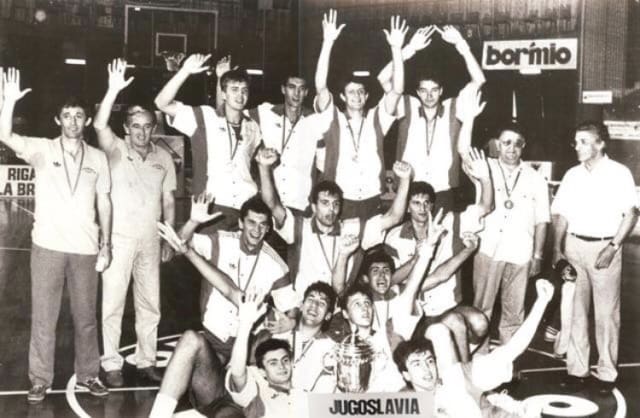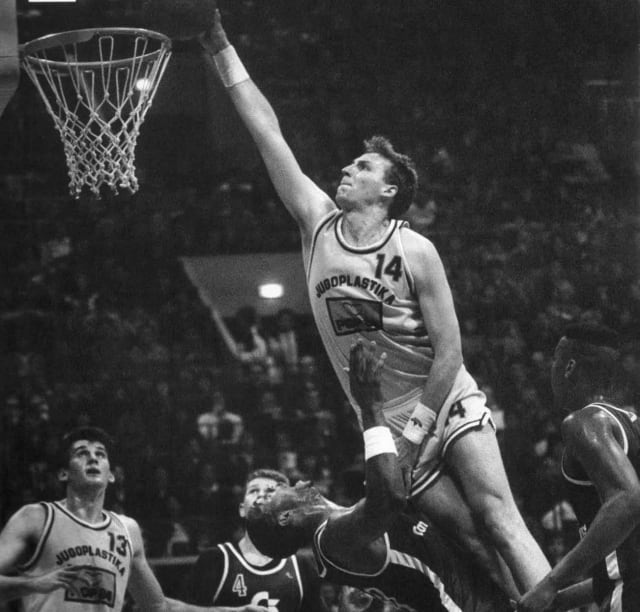Dino Radja on U19 World Cup 1987 win: ''That team was unbelievable''
DEBRECEN (Hungary) - If experience is the best teacher, then Dino Radja has one of the best educations a basketball star could ever have. One of his best experiences? Winning the U19 Basketball World Cup.
DEBRECEN (Hungary) - If experience is the best teacher, then Dino Radja has one of the best educations a basketball player could ever hope to have.
A man who tasted glory on so many occasions during a long career, among his most important achievements was winning the FIBA U19 Basketball World Cup in 1987.
 Radja played for the all-conqueringYugoslavia team that won the FIBA U19 Basketball World Cup in 1987
Radja played for the all-conqueringYugoslavia team that won the FIBA U19 Basketball World Cup in 1987
"Really that team was unbelievable," said Radja, who performed the draw for this year's FIBA U19 Basketball World Cup in Debrecen, Hungary.
It was an unforgettable experience for many reasons, but one memory is particulary vivid.
"It was something really great," he said. "Everybody was thinking, ‘Americans, they’re untouchable.’ And beating them twice in one tournament was an amazing feeling."
Radja,Toni Kukoc, Aleksander Djordjevic and Vlade Divac were among the most notable players in that Yugoslavia team that was coached by current Serbia national team boss, Svetislav Pesic.
The USA had future Larry Johnson, Gary Payton, Lionel Simmons, Scott Williams, Stacey Augmon and others that would go on to have NBA careers.
“HARD PRACTICES, DISCIPLINE, ALL OF THE WORK - THAT’S HOW YOU SUCCEED IN THE FUTURE"
"We had two different games," Radja said. "In the first game, Toni went crazy hitting threes, like 11 out of 12."
Yugoslavia won, 110-95, and Kukoc finished with 37 points.
"Then in the Final, we were talking about it in the locker room, they were going to take care of him (Kukoc)," Radja said
"Our game plan was different. Divac and myself, we got about 40 points and 40 rebounds in total (combined). We had a good coach."
Yugoslavia won 86-76.
"Looking at these things from a distance after many years, you realize that moment was the start of something really big in world basketball," Radja said
"One generation took the challenge of going to the NBA, succeeding in the NBA and proving to the NBA world that we exist and we can do well. If you look at the world before then and today, almost half of the players are in the NBA (now). It was almost unthinkable in those years."
 The hard work paid off for Radja, who won two EuroLeague crowns with Jugoplastika
The hard work paid off for Radja, who won two EuroLeague crowns with Jugoplastika
Radja, Kukoc, Divac and Djordjevic and Drazen Petrovic, who wasn't on the U19 World Cup team, played in the NBA, with Kukoc and Divac having the longest careers overseas.
Arvydas Sabonis and Sarunas Marciulionis also had successful careers in the USA and many other internationals, particularly from Europe, followed and had legendary careers, like Dirk Nowitzki, Tony Parker, Pau and Marc Gasol and Goran Dragic.
For the last four years, the MVP of the league has come from Europe, with Nikola Jokic claiming the honor the last two seasons and Giannis Antetokounmpo the two before that.
Luka Doncic is now among the best and most popular players in the NBA.
The U19 World Cup that he won with Yugoslavia remains a cause for celebration for everyone associated with that team. Yet that summer also had a low point.
Radja remembers that after spending weeks preparing, the event in Bormio, Italy, almost didn't take place.
 Radja represented Croatia at the FIBA Basketball World Cup 1994 in Toronto
Radja represented Croatia at the FIBA Basketball World Cup 1994 in Toronto
"We were preparing for this tournament for two months and then there was a landslide in Italy in that area and the tournament was to be cancelled," he said.
"We were in the mountains for some time, for a week, not knowing if we were going to play. And after you spend two months getting ready, and we were European champions from the year before and had aspirations to do something again, that week of uncertainty of not knowing what would happen.
Finally, they just postponed the tournament for some time and we went there and played. The uncertainty was then worst thing."
Most of the memories are good ones, though.
"One thing I remember about that team from Bormio ’87 was that we were great friends," Radja said. "We are today the same. We have a group that still exists, like with our doctor who is 85 years old and is a member of our group, and our coach is a member of the group.
"One is in Japan, one is in China, one is in Bosnia, Croatia, in America all over the world and we are still in contact and have this great connection."
Yugoslavia eventually broke up as a country. Radja and Kukoc ended up playing for Croatia. There are also national teams of Serbia, Bosnia and Herzegovina, Slovenia and Montenegro.
The bond that the players had in 1987, as Radja said, remains strong.
"I could tell you so many stories that proved that point, what we have been through, what we have lived through in our lives," Radja said. "Where we are today. I really doubt that you are going to find anything in history, not only basketball, but other sports, that did something like that, 36 years ago and still everybody is in contact. From first to last.
"Even the doctor and the coach. Everybody is in the group. On a daily basis everyone is sending you messages - a joke, a happy birthday, Happy Christmas, New Year’s… everybody."
Inducted into the Naismith Memorial Basketball Hall of Fame in 2018, and FIBA Hall of Fame candidate, Radja's words carry a lot of weight. The youngsters that are going to play at the U19 World Cup should listen to how he became so good.
"The thing is you start from the really early stages of your basketball life to get used to certain things," he said. "Hard practices, discipline, all of the work - that’s how you succeed in the future because when you learn these things very early, they become automatic for you.
"And then when you play the game, you don’t have to think about them anymore. So you can concentrate on some other things.
"When I talk to some kids, I always tell them a couple of things that are important. First, the mother of success is repetitions. So if I do 100 of something one day, you do 50 of something one day, after one year, who is going to be a better player? After 10 years, who is going to be a better player?
"You cannot cheat because if the coach tells you to do 10 and you do nine, you didn’t steal that one from the coach. You stole that one from yourself. If you do 11, you didn’t do it for your coach, you did it for yourself. And if you come in front of the only judge in your life, the mirror, you can’t lie to him. He knows."
Radja is thankful for the opportunities that came his way.
"I knew everything because our basketball education was huge," he said. "We had really great coaches to work with. I was really blessed to work with so many personalities; they educated us so well."
Radja's advice for the players that compete at the U19 World Cup in Debrecen from June 24 to July 2?
"It's very simple," he said. "Enjoy, you are kids and you don't have to do anything but your best, your maximum."
FIBA
